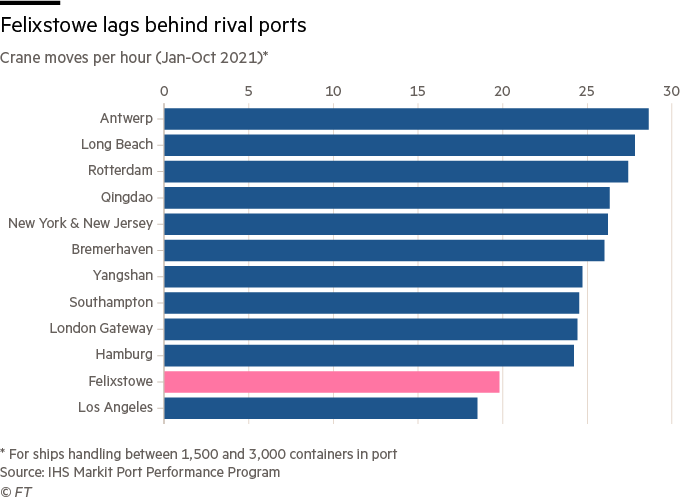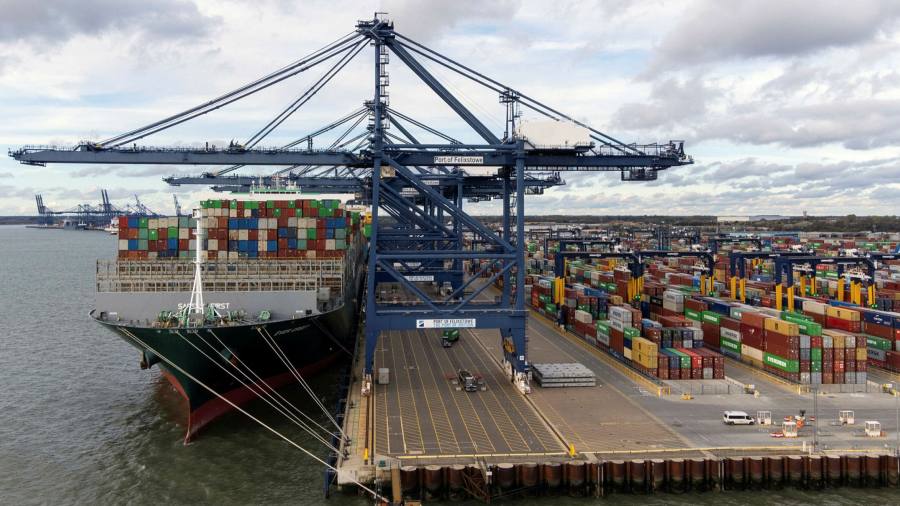Two of the world’s leading shipping companies are planning to divert some vessels away from Felixstowe until March, amid concerns about the weak performance of the UK’s largest container port.
A year after Felixstowe was ranked the worst-performing port among key competitors in Europe and Asia, data shows the Suffolk hub owned by Hong Kong’s CK Hutchison continues to lag behind rivals.
Dockside cranes at Felixstowe were shifting an average of just under 20 containers per hour between January and October this year, dipping to 17.8 in October, according to data provider IHS Markit.
The IHS Markit figures on crane efficiency mark out Felixstowe, which handles 36 per cent of UK container traffic, as the worst performer among the world’s big ports, except for Los Angeles.

Turnround times for loading and unloading at Felixstowe averaged almost 60 hours per ship between January and October, almost a full day longer than in 2019, added IHS Markit. Turnround times for October averaged 73.6 hours.
Shipping lines Maersk and Mediterranean Shipping Company, which operate a capacity sharing alliance, decided last month they would divert vessels on a route from Asia that usually call at Felixstowe to Wilhelmshaven in Germany until March.
“As a result of unusually high waiting times in the port of Felixstowe, we will relocate the service up until March 2022,” Maersk said in an advisory to clients.
MSC declined to comment, but one person close to the company confirmed it was diverting vessels on the route from Asia away from Felixstowe to Wilhelmshaven.
The decision by the two shipping lines to bypass Felixstowe adds inefficiency to Britain’s already troubled supply chains because goods will arrive later on smaller vessels at less busy hubs.
The port of Felixstowe said it had “worked hard to minimise berthing delays”.
It conceded ships were staying in port longer, but said this was because vessels had grown significantly larger since 2019, and so were making fewer calls, but taking longer to unload.
The port operator also blamed a UK lorry driver shortage for doubling the time imported containers were sitting in the hub, from 4.5 to 10 days, which was adding to congestion. “We are seeing around 4,000 less haulier visits a week over 2019,” it added.
When containers spend longer at the port, yard storage risks becoming constricted, which in turn can make it harder to operate cranes efficiently.
“Productivity has been affected by wider supply chain issues and the increased number of containers stored on port but is better than last year and is improving as yard pressure eases,” said the port of Felixstowe.
Rory Munday, managing director of Dayguard, a logistics provider that has an average of 200 containers a week going in and out of Felixstowe, said that moves per hour had “definitely dropped” in recent weeks.
“These big boats have been in the making for many years and previous Felixstowe management did not recognise that, but ports like Rotterdam and Antwerp looked to develop new options,” he added.
Joe Zlotek, director at Viking Logistics, said the haulier was struggling to obtain vehicle booking system slots at Felixstowe to pick up containers, and he was spending an extra £4,500 a week to get “guaranteed” positions. “I’ve never known it this bad,” he added.
One freight forwarder said Felixstowe was suffering from staff absences due to Covid-19 and slow recruitment of new workers.
Jason Flower, chair of Felixstowe Port Users’ Association, said the Covid-19 situation had provided “challenges” in recent weeks, but that “overall our membership has seen an improvement this year” in services from the hub.


